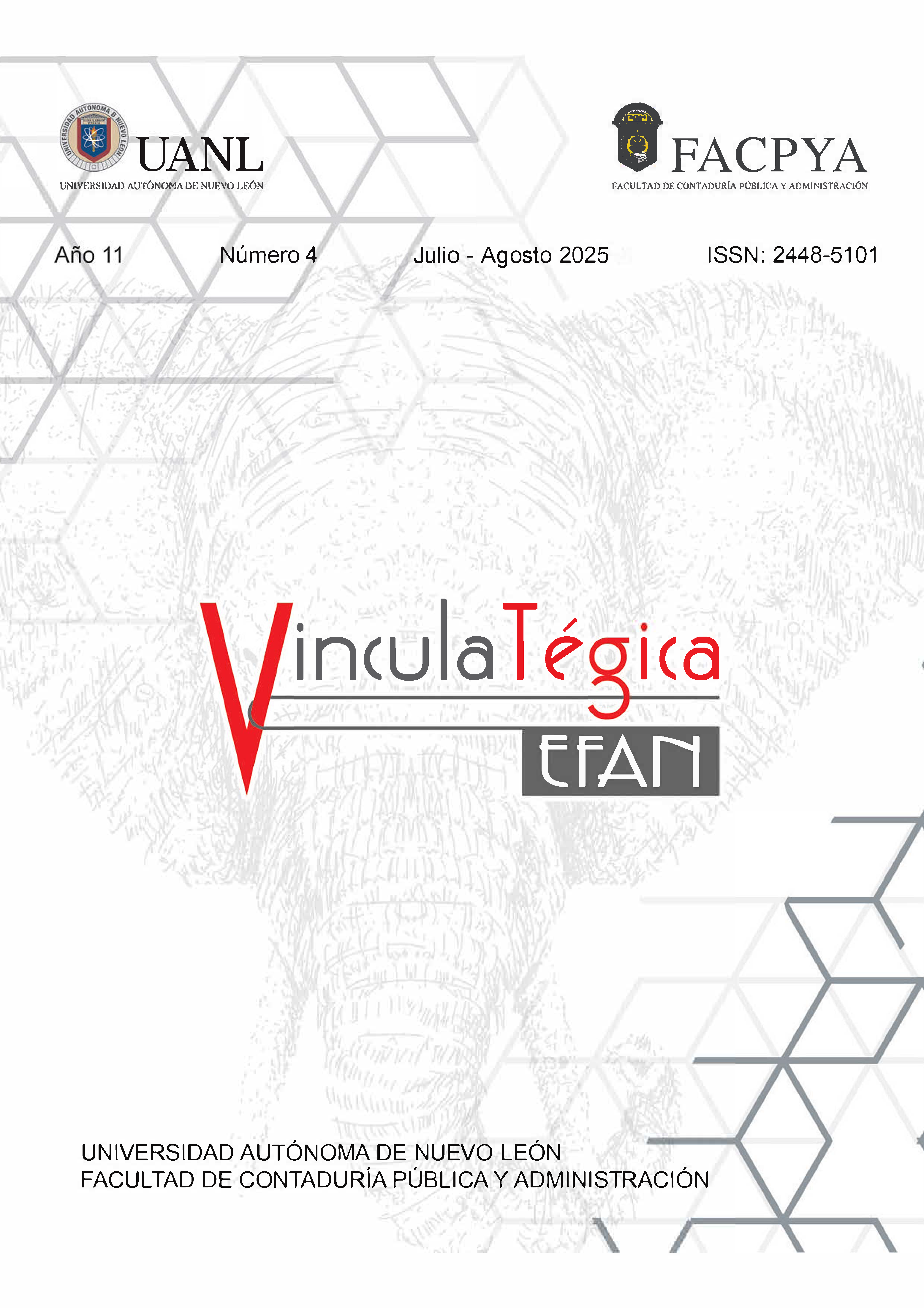The presence of exclusion actions in the opinion of professors at a Technological Institute in Mexico.
DOI:
https://doi.org/10.29105/vtga11.4-1174Keywords:
Exclusion, Inclusion, Higher EducationAbstract
This study describes the perceptions of 28 teachers from a technological institute located in Veracruz, Mexico, regarding actions that inhibit inclusion, such as: Harassment; Gender-based violence; Discrimination; Bullying and disability. Methodologically, the approach was mixed (qualitative and quantitative); a non-experimental, cross-sectional design, and a descriptive scope. The results allow us to report the situation in which the Institution finds itself under the gaze of the surveyed teachers using a questionnaire with a Likert-type scale of Nothing, Little, Much and Totally, who mostly indicated that they knew little about the types of disability and a lot about bullying; Only about 30% reported incidents of harassment, gender violence, and discrimination, specifying that they themselves address the problem. In addition, they considered that the institution is ill-prepared to deal with this type of action. Qualitatively, he highlighted the importance that teachers attach to training, and the lack of identification of inclusion actions carried out by the institution; They proposed five categories that could help improve it: 1) Training; 2) Specialist support; 3) Enforcement of regulations; 4) Facility improvements; and 5) Communication.
Downloads
References
Aguilar-Barojas, S. (2005). Fórmulas para el cálculo de la muestra en investigaciones de salud. Salud en Tabasco Vol. 11, No. 1 y 2, Enero-Abril, Mayo-Agosto 2005, 11(1 y 2), 333-338. https://www.redalyc.org/articulo.oa?id=48711206
Ainscow, M., Dyson, A., & Weiner, S. (2013). From Exclusion to Inclusion A review of international literature on ways of responding to students with special educational needs in schools. En clave pedagógica: Revista internacional de Investigación e Innovación Educativa, 13, 13-30. https://dialnet.unirioja.es/servlet/articulo?codigo=4702760
Ben-Naim, S., Laslo-Roth, R., Einav, M., Biran, H., & Margalit, M. (2018). Academic self-efficacy, sense of coherence, hope and tiredness among college students with learning disabilities (1st ed.). ImprintRoutledge. DOI: https://doi.org/10.4324/9781351107570-3
Cámara de Diputados del H. Congreso de la Unión. (7 de Junio de 2024). Ley General de Educación. Diario Oficial de la Federación: https://www.diputados.gob.mx/LeyesBiblio/pdf/LGE.pdf
Carolissen, R., Shefer, T., & Smit, E. (2024). A critical review of practices of inclusion and exclusion in the psychology curriculum in higher education. PINS-Psychology in Society, 7-24. https://doi.org/https://doi.org/10.17159/2309-8708/2015/n49a2 DOI: https://doi.org/10.17159/2309-8708/2015/n49a2
Castellanos Pierra, L. I., & Zayas Pérez, F. (2019). La exclusión entre pares: sus implicaciones en la formación de los y las estudiantes. Diálogos sobre Educación, 10(19), 1-17. https://doi.org/https://doi.org/10.32870/dse.vi19.531
Fundación Caser. (2024). TIpos de discapacidad. Fundación Caser: https://www.fundacioncaser.org/discapacidad/fisica/introduccion
García López, T., Melgarejo Galindo, L., & Pérez Tirado, M. (2024). La presencia de la exclusión en la educación superior. La opinión de estudiantes de un Instituto Tecnológico. Parte I. En R. A. López Meraz, I. Montes Nogueira, & E. A. Martínez Reyes, Innovación educativa sostenible y tecnológica ascendiente (Primera ed., págs. 156-173). Xalapa, Veracruz, México: Red Iberoamericana de Academias de Investigación A.C. https://redibai-myd.org/wp-content/uploads/2025/02/978-607-5893-21-1.pdf
García-Vita, M., Medina-García, M., Polo, A., & Higueras-Rodríguez, L. (2021). Socio-Educational Factors to Promote Educational Inclusion in Higher Education. A Question of Student Achievement. Education Sciences, 123. https://doi.org/https://doi.org/10.3390/educsci11030123 DOI: https://doi.org/10.3390/educsci11030123
Jelle, M. (2017). An organisational perspective on social exclusion in higher education: A case study. Education as Change, 21(3), 1-19. https://doi.org/https://doi.org/10.17159/1947-9417/2017/1492 DOI: https://doi.org/10.17159/1947-9417/2017/1492
Lopatina, H., Tsybuliak, N., Popoya, A., Hurenko, O., & Suchikova, Y. (2023). Inclusive education in higher education institution: Are Ukrainian faculty members’ ready for it? Research in Education, 118, 49-72. https://doi.org/https://doi.org/10.1177/00345237231207721 DOI: https://doi.org/10.1177/00345237231207721
Martínez Alvarez, N., & Martínez López, L. (2022). Diversidad y educación inclusiva en la universidad: labor del docente. Vinculatégica EFAN, 8(5), 39-48. https://doi.org/DOI: https://doi.org/10.29105/vtga8.5-214 DOI: https://doi.org/10.29105/vtga8.5-214
Martínez Alvarez, N., & Martínez López, L. (Julio de 2023). Inclusión educativa universitaria: Caso estudiantes con trastorno espectro autista (TEA). Vinculatégica EFAN, 9(4), 56-70. https://doi.org/https://doi.org/10.29105/vtga9.4-400 DOI: https://doi.org/10.29105/vtga9.4-400
Martins, H., Borges, M., & Gonçalves, T. (2017). Attitudes towards inclusion in higher education in a Portuguese universitary. International Journal of Inclusive Education, 527-542. https://doi.org/https://doi.org/10.1080/13603116.2017.1377299 DOI: https://doi.org/10.1080/13603116.2017.1377299
Navarro Alvarado, A., González Moreno, C. D., & Becerra Bizarrón, L. (2022). Nuevas características institucionales. La inclusión, concepciones, elementos y aplicación en las instituciones educativas de nivel superior. Vinculatégica EFAN, 8(6), 72-85. https://doi.org/DOI: https://doi.org/10.29105/vtga8.6-274 DOI: https://doi.org/10.29105/vtga8.6-274
Romero Palencia, A., & Plata Santander, J. V. (Diciembre de 2015). Acoso Escolar en Universidades. Enseñanza e Investigación en Psicología, 20(3), 266-274. Enseñanza e Investigación en Psicología: https://www.redalyc.org/pdf/292/29242800003.pdf
SEP. (2017). Aprendizajes Clave para la Educación Integral. (S. d. Pública, Ed.) Plan y programas de estudio para la educación básica: https://www.sep.gob.mx/work/models/sep1/Resource/10933/1/images/Aprendizajes_clave_para_la_educacion_integral.pdf
Shutaleva, A., Martyushey, N., Nikonova, Z., Saychenko, I., Kukartsev, V., Tynchenko, V., & Tynchenko, Y. (2023). Sustainability of Inclusive Education in Schools and Higher Education: Teachers and Students with Special Educational Needs. Sustainability. https://doi.org/https://doi.org/10.3390/su15043011 DOI: https://doi.org/10.3390/su15043011
Tight, M. (2023). Bullying in higher education an endemic problem? Ter Edu Manag 29, 123-137. https://doi.org/https://doi.org/10.1007/s11233-023-09124-z DOI: https://doi.org/10.1007/s11233-023-09124-z
Universidad Internacional de Valencia. (25 de Mayo de 2022). Las diversas formas de bullying: físico, psicológico, verbal, sexual, social y ciberbullying. Educación y Psicología: https://www.universidadviu.com/es/actualidad/nuestros-expertos/las-diversas-formas-de-bullying-fisico-psicologico-verbal-sexual
Zhang, H., Rosen, S., Cheng, L., & Jingshan, L. (2018). Inclusive Higher Education for Students with Disabilities in China: What Do the University Teachers Think? Canadian Center of Science and Education, 104-115. https://files.eric.ed.gov/fulltext/EJ1194696.pdf DOI: https://doi.org/10.5539/hes.v8n4p104
Downloads
Published
How to Cite
Issue
Section
License
Copyright (c) 2025 Marisa Pérez, Teresa García López, Daniel Armando Olivera Gómez

This work is licensed under a Creative Commons Attribution 4.0 International License.
a). Authors keep copyright and give the journal the right of the first publication of the work under a Creative Commons attribution license. This license allows others to share the work as long as original authorship and initial publication in this journal is acknowledged.
b). Authors may make other independent and additional contractual agreements for the non-exclusive distribution of the version of the article published in this journal (e.g., include it in an institutional repository or publish it in a book) as long as they clearly indicate that the work was published for the first time in this journal.







